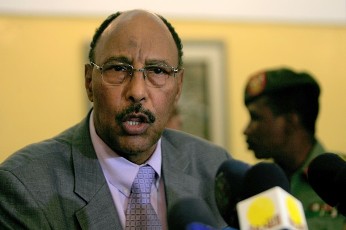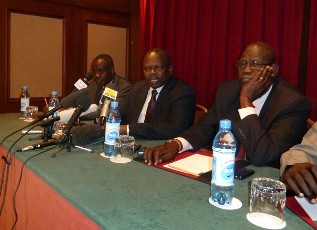Security talks between Sudan & South Sudan break up with no deal
April 4, 2012 (KHARTOUM) – A tense round of negotiations between Sudan and South Sudan on security was adjourned Wednesday without an agreement, due to Khartoum’s reservations over the mediation’s proposal.

The draft agreement, made up of six points including an immediate cessation of hostilities and withdrawal of armed forces from each others’ territories, was hoped to deescalate growing tension that saw the two neighbours engaging in serious military confrontations last week.
Following the disagreement, the mediation team of the African Union High Level Panel (AUHIP), led by former South African President Thabo Mbeki, intervened by putting forward a conciliatory proposal.
However, Sudan’s negotiators refused to sign the AUHIP’s proposal and requested time to consult with the leadership in Khartoum.
According to sources in Addis Ababa, Khartoum’s military negotiators had cited dissatisfaction with the proposal as it does not include a clear-cut sentence on South Sudan’s support to the rebels of the Sudan People’s Liberation Movement North (SPLM-N) in South Kordofan and the three main Darfur rebel groups.
Sudan’s defense minister, Abdel-Rahim Mohamed Hussein, who led his country’s team to the talks, articulated Khartoum’s position upon returning from Addis Ababa on Wednesday.
“We explained [to the mediators] that it [their proposal] requires further study and analysis, and that we must refer it to Khartoum because the [proposed] paper contains political, military and security issues and must be reviewed by the respective authorities” he told reporters.
Hussein went on to say that they already have some “observations” on the proposed paper, saying it lacks proper definition of boundaries and acknowledgment of Juba’s support to rebels.
“We believe that the 1956 borders are the basis on which we can decide the disputed territories, this was not clear in the paper” he said.
The second point, he said, is the lack of transparency regarding South Sudan’s support to the rebels.
“The fact that they [South Sudanese] say they are not harboring, or supporting the work, of anti-north groups from Blue Nile and South Kordofan means that we got off on the wrong foot of non-transparency and lack of clarity. This is another point of disagreement,” Hussein explained.
The Sudanese minister said they had insisted during the talks that South Sudan’s army, known as the SPLA, must completely repudiate its former 9th and 10th divisions which make up the army the rebel SPLM-N.
Hussein said they drew an analogy during the talks between the current standoff with South Sudan and the one Khartoum once had with Chad, saying that transparency between Khartoum and Ndjamena regarding rebel support was vital to overcoming their mutual mistrust and end their protracted hostilities.
“We hope it will be the same with the South because the ties we have with it are bigger than any other,” he added.
He concluded by saying that they had informed the AUHIP that they would return to the negotiations table whenever the negotiations ground is prepared –whether in a week or ten days.

“They have literally walked out… We are ready to sign but Khartoum ran,” South Sudan’s chief negotiator Pagan Amum said. “It’s war mongering that made them not to sign and nothing else,” he said.
Mbeki has also confirmed that the South Sudanese delegation was ready to sign the proposal but its Sudanese counterpart had asked for time to have consultations with Khartoum.
“The delegation of the government of Sudan felt that it had to take the document back to Khartoum because it felt that it was necessary … to have consultations in Khartoum,” he said in Addis Ababa, as reported by AFP.
Meanwhile, Sudan Tribune has learned that Mbeki is expected to arrive in Khartoum today, Thursday, before moving to Juba in an effort to revive plans for a summit between Sudan’s President Omer Al-Bashir and His South Sudanese counterpart Salva Kiir Mayaridt.
The two leaders were scheduled to meet in Juba on 3 April but Khartoum cancelled the plan after military confrontations between the SPLA and the Sudanese army in the oil-rich town of Heglig inside Sudan’s territory last week.
Following Heglig’s clashes, South Sudan accused Sudan of launching a series of airstrikes targeting oilfields in the country’s northern state of Unity.
Last week’s confrontations were the most serious between the two countries since South Sudan seceded from Sudan in July last year under a 2005 peace deal that ended more than two decades of north-south civil war in the former united Sudan.
(ST)
